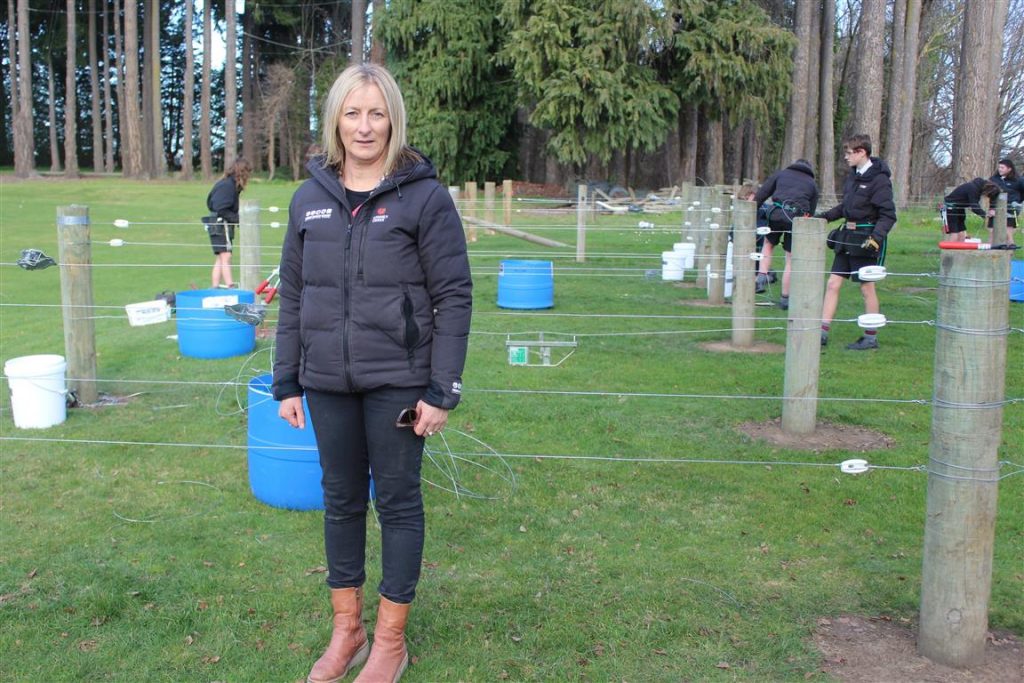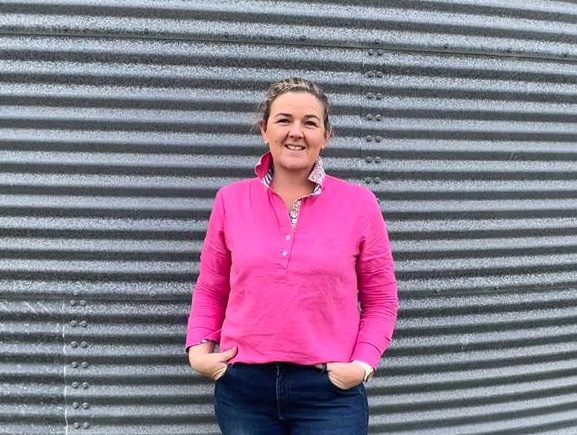BY SALLY RAE
The semi-finalists for the Year of the Farmer are in. They include farmer Tash White, of Ashburton, and educator Sarah Foley-Smith, of Geraldine High School.
To vote in the People’s Choice awards go to: www.odt.co.nz/ rural-life/farmlands/peopleschoice
Tash White loves seeing people engaging in agriculture and learning about the values and innovations involved in the sector.
As her nominator says, ‘‘Tash’s passion for farming shines through in everything she does’’ —whether it was supporting and teaching the AgriKids teams at her local school, donating and coordinating the sale of pea straw for the senior class to sell to raise money for school camp, or welcoming visiting groups wanting to learn about agriculture on their farm, including preschoolers.
She was also raising three very passionate young farmers with her husband Dan — Tabitha, Edward and Harriet —and she supported them in their AgriKids and TeenAg study.
White felt privileged to be the third generation on her family farm, just south of Ashburton, which is arable, along with lamb and beef fattening. She and Dan came back in 2005 to manage the property.
Since then, they moved to leasing and then went into a business partnership with her parents before purchasing the 380ha property last year.
The couple were there for the flexibility and lifestyle that farming afforded and to build a future for their children —‘‘to look after the land for the next generation and to carry on a legacy my grandparents started’’, she said.
When White first returned to the farm, she was invited to join the Foundation for Arable Research’s newly formed Women in Arable group and that sowed the seed for the couple’s involvement in FAR.
It encouraged her to have the confidence to take things on and speak up in what was once a very male-dominated industry and she had managed to upskill a lot through things they had offered.
She was also involved with getting Arable Ys off the ground, the group providing an opportunity for younger arable farmers, staff and industry personnel to upskill in a comfortable environment while also having the opportunity to socialise with their industry counterparts.
She is also joint vice-chair of Mid Canterbury Federated Farmers and, while the policy and advocacy side of the industry was not really her strength, it had been a good learning experience stepping into the role, she said.
For the past six years, White has gone to Longbeach School to help the pupils do some rural study and also having children come on to the farm.
She was passionate about getting children involved in the industry and to see there was so much involved in the sector — not just driving a tractor or milking cows.
A dress-up day saw some come dressed as scientists, which was great.
White, who is also show secretary for Tinwald Pony Club, said she and her husband definitely worked as a team.
‘‘Nothing much gets decided without the both of us.’’

Sarah Foley-Smith says today’s teens are an age group which is skilled, underrated and under-utilised.
She runs the Primary Industry Academy (PIA) at Geraldine High School, collaborating with businesses to create a practical education in farming.
Her nominator said she captured the hearts and minds of those she taught who often were not the most engaged pupils in other subjects.
Part of the Primary ITO trades academy, her course was ‘‘100% practical’’ because those pupils choosing to take it were not sit-in-the-classroom types — they were those who ‘‘get out and do’’.
Skills in fencing, farm bikes, tractors, water supply, chainsaws and animal handling were offered and a key feature was the amount of voluntary community work undertaken.
The programme had morphed over the 11 years it had been run and every year was different, depending on the pupils.
But fencing was the academy’s cornerstone and it was a skill former pupils all said they were grateful they had learned as fencing skills were lacking in the industry.
In June, the school entered the cadet fencing competition at the national Fieldays at Mystery Creek and placed fourth.
It was the first school to enter the competition and, from there, it intended to run a South Island cadet fencing competition.
Two crews were also sent to Hawke’s Bay to help with Cyclone Gabrielle recovery fencing.
Her pupils could fence ‘‘really, really well’’ and ‘‘we’ve made names for ourselves through various natural disasters over the years’’.
There were no prerequisites to get into the class — it was all about attitude, she said.
She did not care if ‘‘the naughtiest child in the school’’ applied — but, once in, they were required to ‘‘pull their head in and toe the line’’.
It was all about learning employability skills – ‘‘attitude is everything’’ – a work ethic, knowing that they had to start at the bottom and also doing something for nothing.
And, for voluntary events and fundraisers, it was Foley-Smith who picked up all the pupils in a minivan. The process takes about two hours, but meant nobody was disadvantaged. Weekends were often given up for her pupils.
Many of her pupils had never done well in any other class, let alone receive a reward or a certificate. In the Primary Industry Academy, they could all shine.
‘‘They are so amazing and every single one is a superstar. They are really enthusiastic. I don’t really need a reliever if I’m not here, they just sort themselves out and away they go. They are so engaged, it just needs someone to do just a little bit of organising . ..’’
Foley-Smith grew up on a Waimate sheep and cropping farm. She taught at Central Southland College in Winton for 10 years before taking a break from teaching.
Moving to Canterbury — her husband Glen is chief executive of Rangitata Dairies — the role at Geraldine High School fell into her lap and the academy had been supported by a ‘‘fabulous’’ community.
Earlier this year, a former pupil got in touch to ask if he could speak to the current pupils. At 20, he was contract milking.
‘‘Most of my students are way beyond my pay range now,’’ she laughed.
‘‘It’s so cool when students, who are kind of written off at school, are out in the big wide world doing extraordinarily well for themselves.’’
Foley-Smith acknowledged not all her pupils were going to be farmers and that did not bother her. For some, it was a case of needing her ‘‘to look after them for two or three years so they don’t fall by the wayside’’.
The academy was now drawing pupils to the school and, for former pupils, having PIA on their CV meant they usually got an interview.
The class motto was ‘‘bat your eyelashes, smile nicely and the world will smile back at you’’.
‘‘Never underestimate batting your eyelashes — it’s attitude and who you know. We’re really good at making posh friends,’’ she laughed.
At the moment, there were 44 pupils and that number was fine with her.
‘‘I’m the limiting factor, I can’t fit more hours in the day — or people in the minivan.’’




